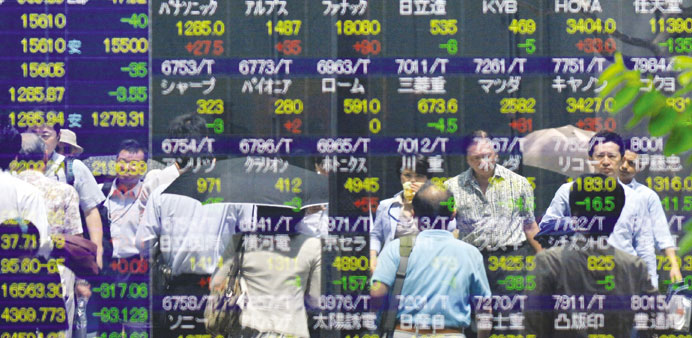Pedestrians in reflection walk past a share prices board in Tokyo. The Nikkei 225 index ticked up 0.06% at 18,797.94 points yesterday.
AFP/Tokyo
Asian markets were mixed yesterday after US inflation data renewed speculation of an interest rate hike, as Tokyo advanced to a fresh high despite disappointing figures challenging Japan’s war on deflation.
Official data showed Japanese inflation slowed for a sixth straight month in January, dampened by weak consumer spending and falling energy prices—its lowest level since May 2013.
Tokyo stocks edged up to a fresh 15-year high, despite profit-taking largely erasing earlier gains that were driven by the yen’s fall.
The Nikkei 225 index at the Tokyo Stock Exchange ticked up 0.06%, or 12.15 points, to end at 18,797.94, while the Topix index of all first-section issues advanced 0.14%, or 2.17 points, to 1,523.85.
Seoul slipped 0.37% in cautious trading after a recent rally with the benchmark KOSPI closing down 7.28 points at 1,985.80. Sydney climbed 0.34%, closing up 20.3 points to 5,928.8.
Hong Kong stocks fell 0.32%, losing 78.77 points to 24,823.29. Shanghai added 0.36%, or 11.94 points, to 3,310.30 ahead of a key meeting next week that investors hope might yield policies to spur economic reforms.
In other markets, Kuala Lumpur gained 0.34 points, or 0.02%, to close at 1,821.21; Tenaga Nasional went up 1.52% to 14.72 ringgit, AMMB Holdings rose 0.31% to 6.39 while Sime Darby dropped 0.43% to 9.33 ringgit.
Bangkok dropped 0.41%, or 6.54 points, to 1,587.01 baht; Bank of Ayudhya lost 5.34% to 62baht, while supermarket operator Big C Supercenter fell 2.50% to 234baht.
Singapore closed down 0.68%, or 23.22 points, to 3,402.86; commodity traders Noble Group declined 8.02% to Sg$0.98 while United Overseas Bank rose 0.35% to Sg$23.07
Jakarta ended down 0.02%, or 1.13 points, at 5,450.29; coal firm Bukit Asam gained 2.40% to 10,675 rupiah, while cement maker Semen Indonesia slipped 1.49% to 14,875 rupiah.
Wellington rose 16.79 points or 0.29% to 5,8478.47; Air New Zealand was up 1.79% at NZ$2.85 and Fletcher Building fell 1.59 to NZ$8.64.
Manila closed 33.82 points or 0.44% lower to 7,730.57; SM Prime Holdings fell 1.98% to 19.80 pesos, Jollibee Foods Corp rose 3.70% to 218.60 pesos, while Universal Robina was up 0.57% to 212.60 pesos.
Markets in Taiwan were closed for a public holiday.
“Investors are quite focused on the meeting and they are waiting to see what will come out of it,” Qian Qimin, an analyst at brokerage Shenwan Hongyuan Group in Shanghai, told AFP.
The annual meeting of the National People’s Congress, the country’s legislature, which starts Thursday will also unveil the economic growth target for 2015.
“Investors are waiting for more clarity on policies from the upcoming meetings next week,” Clement Cheng, a Hong Kong-based trader at RBC Investment Management Asia, told Bloomberg News.
The dollar eased after rallying on the US inflation figures which pointed to rising price pressures in some areas, which could ease the way for the Fed to hike interest rates.
The dollar weakened to ¥119.31 from ¥119.42 in New York, although it was still higher than ¥118.97 seen in Tokyo earlier Thursday. The euro rose to $1.1217, from $1.1198, and to ¥133.83 from ¥133.72 in US trade. While falling crude oil prices continued to dampen overall inflation in the US, rising pressures were revealed in a number of areas, including shelter and personal care.
Markets have been rife with speculation over when exactly this year the US central bank will start raising interest rates, with Fed Chair Janet Yellen pointing this week to there being no hurry to raise interest rates from near-zero.
“Given that inflation surprises have been negative around the world, anything above consensus is a sign for optimism and a sign for higher rates in the US,” Deutsche Bank strategist Daniel Brehon told Bloomberg News.
Despite Tokyo’s high-profile offensive, Japan’s core consumer inflation, excluding volatile fresh food prices, came in at 2.2% year-on-year, down from 2.5% in December, with the rise in overall consumer prices standing at 2.4%.
The disappointing official price data challenges Bank of Japan governor Haruhiko Kuroda’s claims that inflation is on an uptrend, and boosts the chances that the BoJ will unleash more stimulus to counter the downturn, which would tend to weaken the yen.
Kuroda, however, told a news conference Friday: “As the effects of the decline in crude oil prices on a year-on-year basis dissipate, the two% inflation is likely to be achieved.”
Meanwhile, Japanese factory production in January rose a faster-than-expected 4.0% on-month, growing for the second straight month.
Oil bounced back in Asia on bargain-hunting after tumbling in the previous session over a further surge in US crude reserves, adding to the global supply glut.
US benchmark West Texas Intermediate (WTI) for April delivery rose 84 cents to $49.01 a barrel while Brent crude for April rose 91 cents to $60.96 in afternoon trade.

